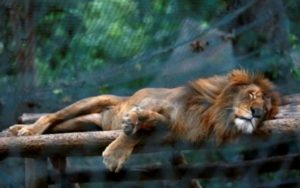
Even the animals are feeling the drought. The Caricuao Zoo in Caracas, Venezuela’s capital, had 50 of its animals starve to death after not being fed for 2 weeks. Vietnamese pigs, rabbits and birds are some of the fatalities at the zoo.
Marlene Sifontes, 52, union leader for employees in the state parks, said: ‘The story of the animals at Caricuao is a metaphor for Venezuelan suffering.’
She said lions and tigers in the zoo in Caracas were being fed mango and pumpkin to make up their meat rations, while an elephant is eating tropical fruit instead of its usual diet of hay.
The zoo’s management declined to comment.
So what does the Venezuelan government plan to do about this crisis?
Venezuela’s Food Minster Yván José Bello Rojas says the food shortage is all one big “exaggeration”.
When told by Reporter Ana Vanessa Herrero that citizens had to wait in lines for days at supermarkets, he replied:
“I’ve been in tons of lines. I went to my favorite sports team’s game this weekend, and I had to get in line to get a parking space. I got in line to buy my ticket. And then … I made a line to get into the stadium. And you know what, I made a line to find my seat. And then you know what,” Bello finished with satisfaction, “I went to go buy an arepa [Venezuelan sandwich] … and I had to wait in line there, too.”
Reporter Ana Vanessa Herrero then asked him about a woman she’d recently interviewed who was looking for diapers for two days and couldn’t find them.
“She’s exaggerating,” he said, “no one would wait in line for six days for anything,” he added, interrupting the chorus of reporters throwing out anecdotes to the contrary.
“The same people can’t just go and buy the same products every day,” Rojas said matter-of-factly, adding that one person couldn’t possibly buy one gallon of milk per day, for example, even if they had the money to do it. “More than anything [the shortage] is a distribution problem because if any government has done their homework on food, it’s this Bolivaran government.”
Herrero said that since this interview was released, she has been blocked from government events and received threatening calls demanding that she take the video down. She took to Twitter to say that under no circumstance would she buckle to government pressure.
The President of Venezuela, Nicolás Maduro Moros, is too busy finger pointing:
“The Maduro government has blamed the crisis on the US and rightwing business owners who it accuses of cutting production to sabotage the economy…”
Since the economic crisis hit Venezuela, the U.S. has subsidized its production to American owned companies located in Venezuela.
Venezuela’s President has also given in to the requests of his citizens and declared the economic crisis a state of emergency.
Food and basic necessities are now distributed in assigned rations to citizens via armed guards. Venezuelans still have to stand in line for hours, sometimes overnight to receive their ration, says reports.
“It’s estimated that the cost of basic groceries that would keep a family going through a week increased by more than 25% between March and April, and now costs 22 times the state minimum salary”.
Unfortunately, it doesn’t look to improve in the near future. Venezuela’s inflation rate (the increase of prices for product, but decrease in currency value) is 482%, the world’s worst. Venezuela’s unemployment rate is also expected to nearly double in the upcoming years.
#PrayForVenezuela
